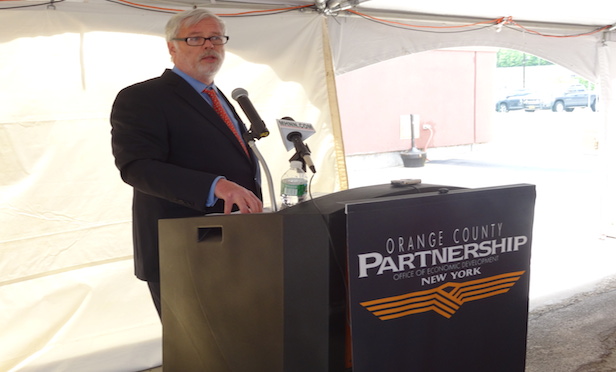 Patrick Foye was nominated by Gov. Andrew Cuomo as chairman of the Metropolitan Transportation Authority. (File Photo)
Patrick Foye was nominated by Gov. Andrew Cuomo as chairman of the Metropolitan Transportation Authority. (File Photo)
ALBANY—Gov. Andrew Cuomo did not have to look far in selecting the person to lead the Metropolitan Transportation Authority as the state looks to enact administrative, regulatory and construction procurement reforms at the MTA going forward.
Current MTA President Patrick J. Foye, a favorite Cuomo transportation appointee, was nominated by the governor as the new chairman of the MTA. Foye will succeed Acting MTA Chairman Fernando Ferrer.
Gov. Cuomo also announced four other MTA Board nominees— Haeda Mihaltses of Queens County and Michael Lynton of Kings County, who will serve as appointments of Gov. Cuomo, as well as Rhonda Herman of Westchester County and Kevin Law of Suffolk County, who were recommended by Westchester County and Suffolk County respectively for MTA Board positions.
“I vowed not to pass a budget without a comprehensive plan to reform the MTA's bureaucracy,” Gov. Cuomo said. “The MTA needs a board that will oversee and manage the transit system so it can best serve its riders, and this critical component of the MTA reform plan will ensure an unmatched level of accountability that New Yorkers deserve. I thank the outgoing members for their service and commitment to improving our state's transit networks.”
The enacted budget also will implement a Congestion Pricing plan in Manhattan and enacts two new transfer taxes on luxury properties in New York City as new sources of funding for MTA capital projects.
Foye, a resident of Nassau County, was named president of the MTA in August 2017, where he has since led key innovation and modernization initiatives and supported day-to-day management of the agency, state officials note. Previously, he served as an MTA Board Member from 2010 to 2012.
Prior to joining the MTA, Foye led the Port Authority of New York and New Jersey as executive director from November 2011 to August 2017, during which time he also served as president of PATH. At the Port Authority, he managed day-to-day operations at the bi-state agency and guided the development of the agency's 10-year, $32.2-billion capital plan, while overseeing some of the nation's most significant P3 transactions, including the redevelopment of LaGuardia Airport and the building of a new Goethals Bridge.
Foye also served as Deputy Secretary for Economic Development for Gov. Cuomo from February 2011 to November 2011, managing initiatives for economic recovery, investment and job creation, and overseeing the Empire State Development Corp.
In addition to his public service, Foye was a mergers and acquisitions partner at Skadden Arps and managing partner of the firm's Brussels, Budapest and Moscow offices.
Foye said of his nomination to MTA Chairman, “”As a lifelong rider—and a daily customer—of the MTA, I can think of no higher honor or more important challenge than serving at the helm of an agency that connects millions of people each day to their jobs, schools, families, and friends. There is no question that we have a great deal of work ahead of us, to bring truly innovative and meaningful reform to the agency and provide the service and system New Yorkers deserve.
The other MTA Board nominees include Mihaltses, who is currently the VP of external affairs for the New York Mets; Lynton, a former CEO of Sony Entertainment, who currently serves on the Board of Snap, Inc., Warner Music Group., Pearson, PLC., and Ares Management, L.P.; Herman, who has served on the Metro-North Railroad Commuter Council since 2008 and currently works at the Internal Revenue Service; and Law, who has been president and CEO of the Long Island Association since September 2010.
In the FY 2020 state budget approved over the weekend by state legislators, a host of MTA reforms are now in the works. It requires the MTA to develop a reorganization plan by June, and modifies MTA Board appointments to align with appointing authority.
Other key reforms include: requiring the MTA to undergo an independent forensic audit and efficiency review, form a major construction review unit made up of outside experts to review major projects, implement a 20-year capital needs assessment beginning in 2023 and increase the competitive procurement threshold from $100,000 to $1 million, establish a 30-day review notice for comptroller contract approval, and requires public reporting on MTA performance metrics.
The budget will also allow the MTA to debar any contractor that exceeds 10% of the contract cost or time on a capital construction project and also requires any MTA capital project more than $25 million to use design-build method.
© Touchpoint Markets, All Rights Reserved. Request academic re-use from www.copyright.com. All other uses, submit a request to [email protected]. For more inforrmation visit Asset & Logo Licensing.







